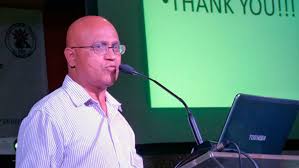Kwayana would appreciate recorded oral history
Dear Editor,
This is in reference to Eusi Kwayana’s retort (KN Nov 12) refuting the claim by (elder) villagers that he was responsible for cutting down fruit trees on the East Coast. As someone with a doctorate in history, it is incumbent upon me to record history of events or human experience (as accurately as possible) as well as to present the viewpoints of the public. The recording of events is simply that. It is not about Sydney King changing his name to the African (or Swahili) Eusi Kwayana. The latter is an act to be saluted, returning to one’s ancestry by restoring a traditional name and practicing ancestral African spirituality. I admire Eusi for his African nationalism and for the role he played in restoring democracy in Guyana in 1992. Few dared to confront the dictatorship as he did.
Every human experience is worthy of consideration as long as they are not fibbing. In that context, I related the views of the people regarding the destruction of their fruit trees in their property.
What better way to record history than to speak with the people who witnessed and or experienced history? It is their narrative – their story. It is called oral history that complements document based history documents peoples stories that have long been neglected in historical research. Oral history allows a people to reconstruct their history, especially when the one in the public domain is inaccurate and not told from their perspective. And their views or accounts of their experience cannot be dismissed or ignored.
Everyone’s experience is important and it must be reported. The people who write history put their own spin that may be clouded by various factors. The peoples’ history is the kind that is far more fascinating that the one written by those who did not experience the events.
Oral history is an account of narrators with personal experience of historically significant events, with the goal of adding to the historical record. It is a primary source and is not intended to present a final, verified narrative of events. It is not etched in stone. It may reflect personal opinion offered by the narrators, and as such it is subjective. It is simply used to gain an understanding and insight into comprehensive history of various experiences. It is about collecting and interpreting human memories to foster knowledge, and where possible, to restore peoples’ dignity that was bruised by terrible experiences as was the case of chopping down harmless trees or violence on the East Coast. My task as a historian is to record these events as accurately as possible as I understand the narrative that was/is related to me.
The history of the cutting of fruit trees was on the minds of the property holders. The incident troubled them and it is permanently etched in their psyche. They remember that episode. They brought it out to me. My task is to narrate it. I leave it to others to interpret or dispute the events. At least it is recorded. It reveals their thinking of him and how he was viewed – whether correct or not. This is an aspect of history that Eusi must address. Surely, as a man grounded in village movement, Eusi would appreciate my role in documenting ordinary peoples’ history giving Eusi and others knowledge of how people view their role in certain historical events.
The narration of the events is but one example of how they perceived the former Sydney King. There are several others. Another one was about that great Buxtonian, Randal Butisingh (the world’s oldest blogger who died at 100 in 2012). Shri Butisingh was a proud Buxtonian who did so much for the village uplifting lives and educating so many in the village, even Eusi himself. Yet Butisingh, a great patriot, was pushed out of the village. He wrote about the 1962 racial disturbances when, as a teacher, he was transferred to Lusignan Primary because he was told he would’ve been beaten in Buxton.
He wrote about his experience. “At one time during the strike, a hostile band, led by a young African teacher from the neighbouring village of Buxton, were heading towards the school. Some of the children saw this and began running out of the school. I tried to restrain them but a fellow teacher thought it the right thing to do to let them go. Seeing this, the hostile band changed direction and departed“. Elders of the area claim Sydney King was that teacher who led the hostile gang. Perhaps Eusi would want to clarify whether he was that “young African teacher” and his role in that particular event.
Yours truly,
Vishnu Bisram






















